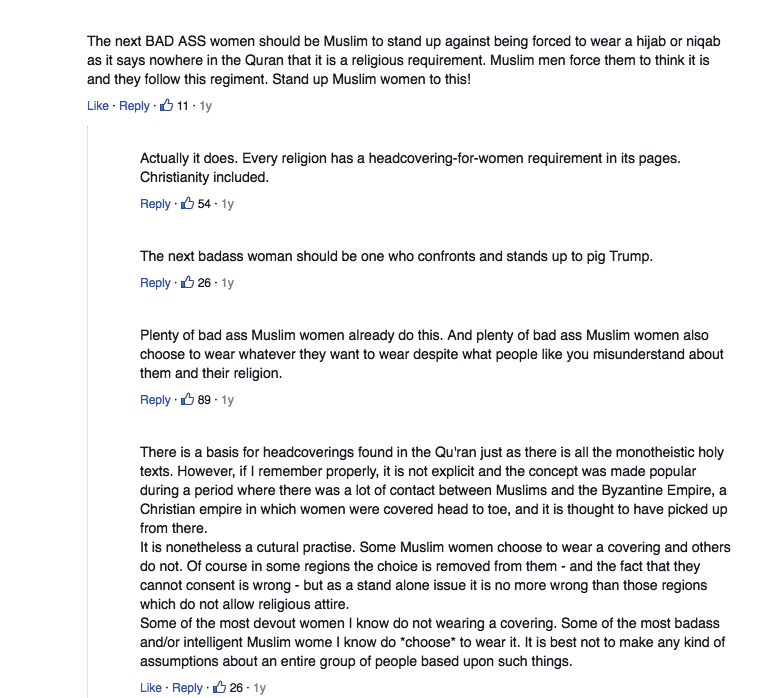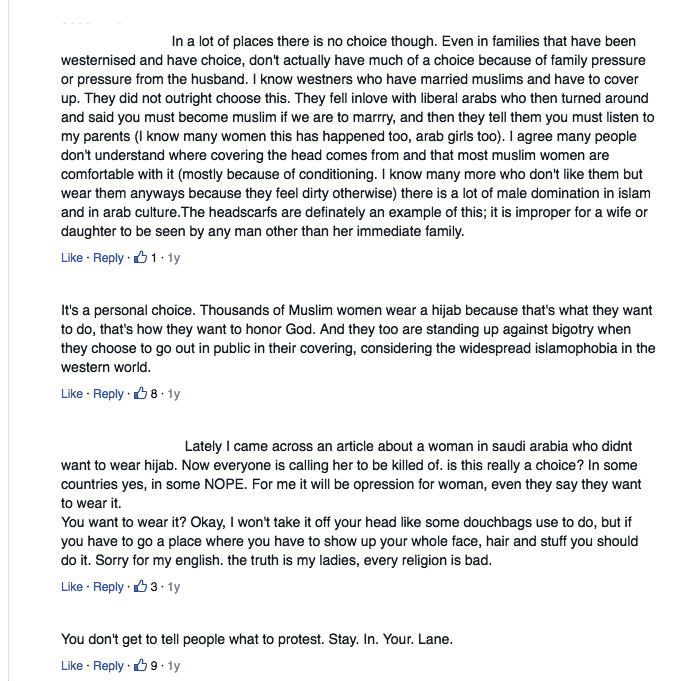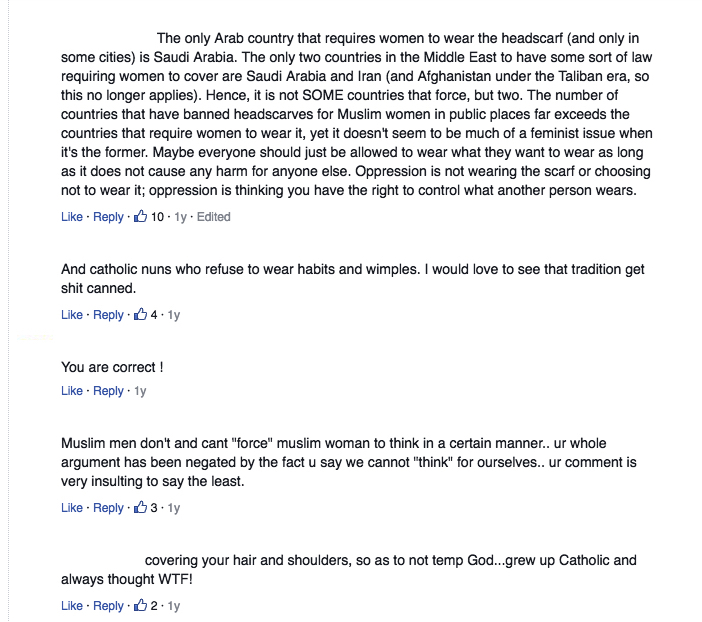"You Don't Get to Tell People What to Protest": Creating Opportunities for Polyvocality
As an extension of noting the opportune moment for responding to sexism, women develop spaces within the comments where polyvocality plays a role. Polyvocality, and particularly the presence of multiple voices without the demand for consensus, is one of the hallmarks of feminist rhetorical practices, even when not explicitly named feminist. As Cristy Beemer (2016) observed, internet spaces where women produce "counter-discourse to the dominant narratives" can become sites of feminist work, even when those places also have "disagreements, personality clashes, and typical 'flaming' episodes" (p. 97). In the comments sections of news articles about feminism and women's issues, the presence of multiple women's voices raised to challenge sexism is particularly noticeable, given the frequency with which women are silenced and how oftena single woman stands alone in countering sexism.
Especially noteworthy in the examples of polyvocality produced in the comments sections of the articles was the presence of contradictory viewpoints among women, which took place without a turn towards vying for the dominance of one particular position. Comments sections tend to be spaces primed to produce arguments that leave no room for alternative views, and discursive practices are often aimed at being or becoming the sole dominant voice. Where women's voices appear as a challenge to sexism but also create room for multiple interpretations and even disagreement, women's rhetorical strategies subvert and stand in sharp contrast to other discussions, where disagreement is intractable and discussion becomes more about shouting down anyone and everyone else.
A striking example of this kind of polyvocality appears in a group of women's responses to a sexist, Islamophobic comment left on the BuzzFeed article "17 Badass Women You Probably Didn't Hear about in 2016," where Hans Dirschberger left a comment reliant on sexist and anti-Muslim stereotypes. Dirschberger wrote that it would be "BAD ASS" for Muslim women to "stand up against being forced to wear a hijab or niqab." In his comment, Dirschberger might initially appear to champion women's right to choose their own garments and reject patriarchal control of women's behavior. However, in arguing that "Muslim men force [Muslim women] to think it is" a requirement to dress a certain way, Dirschberger himself told Muslim women what they should wear, how they should think, and what they should protest.
Dirschberger's comment about Muslim women was met with not one but seven comments from women who challenged the stereotypes and assumptions in his original statement. The commenters challenging sexism tended to repeat and reaffirm one another's arguments while also adding new angles to the discussion. Dirschberger was challenged by Muslim women who mentioned the inaccuracy of his belief that they are forced to wear a hijab, for example. One commenter wrote,
Muslim men don't and cant "force" muslim woman to think in a certain manner.. ur whole argument has been negated by the fact u say we cannot "think" for ourselves.. ur comment is very insulting to say the least.
Other women responded by noting the history of head coverings within Islam and other major religions, including the "habits and wimples" of Catholic nuns, and telling Dirschberger, "You don't get to tell people what to protest." Women expressed multiple views (even comments questioning whether hijabs are or are not oppressive), and responded to each other with examples and alternating perspectives, even when they disagreed.
The comments in this exchange took a polyvocal approach to challenging sexism and anti-Muslim stereotypes, much as the discussion board Beemer (2016) observed provided a space for women to talk back to and challenge medical paternalism: "the knowledge in this space is created by the whole community in an inquiry-based approach, one that reflects feminist values of questioning, complicating, and sharing viewpoints rather than a paternalistic narrative of… top-down authority" (p. 111). The polyvocal responses emerged as a direct challenge to the kind of top-down construction Beemer described, in which the original comment attempted to direct how women behave. Identifying the paternalism, sexism, and Islamophobia in the original comment, women responded by "questioning, complicating, and sharing viewpoints" that generate multiple alternative views, without pushing for the dominance of any one response.
In one wide-ranging conversation on MSNBC, multiple voices both employing and resisting sexism appeared. An initial comment left by a woman criticized GOP legislative strategies, and was met by two commenters: one comment purported to point out hypocrisy, and another two comments employed anti-choice language and anti-feminist stereotypes. Two additional women entered the discussion. The second woman offered a somewhat sarcastic challenge to the anti-choice language of one of the men, suggesting that he "take a biology class and get a little knowledge." She concludes by observing that information on biology, pregnancy, and abortion "worked wonders for [her] daughter," thus challenging the man's ignorance compared to that of an apparent child's knowledge on the subject. The third woman repeated and expanded on the first woman's comment in a typical example of polyvocality, amplification, and validation (discussed further in the next section). By repeating some of the original remark, the second woman was able to reaffirm and build on an earlier perspective.
Polyvocality offers women entrance to conversations in the comments sections that may not otherwise be possible, and that extends beyond the idea of mere safety in numbers, as can be seen by the presence of disagreement within some of those polyvocal conversations. Instead, the presence of one woman's challenge to sexism sometimes serves as a catalyst for further challenges and discussion, disagreement, and validation of women's various contributions.
Reading the Comments: Polyvocality
The following quotations and figures contain conversations pulled from the comments sections included in this study. Some of the comments are those analyzed in the preceding paragraphs; I chose the others to additionally demonstrate the rhetorical principle discussed in this section. All comments have been transcribed as they originally appeared including typos or idiosyncratic spellings, although some have been shortened for the sake of brevity.
Commenter names and avatars or profile images have been removed; pseudonyms have occasionally been added for clarity.

Hans Dirschberger: The next BAD ASS women should be Muslim to stand up against being forced to wear a hijab or niqab as it says nowhere in the Quran that it is a religious requirement. Muslim men force them to think it is and they follow this regiment. Stand up Muslim women to this!
Cheryl Elliott replying to Hans Dirschberger: Actually it does. Every religion has a headcovering-for-women requirement in its pages. Christianity included.
Amy Tower replying to Hans Dirschberger: The next badass woman should be the one who confronts and stands up to pig Trump.
Zoe Moore replying to Hans Dirschberger: Plenty of bad ass Muslim women already do this. And plenty of bad ass Muslim women also choose to wear whatever they want to wear despite what people like you misunderstand about them and their religion.
Ashleigh McDonald replying to Hans Dirschberger: There is a basis for headcoverings found in the Qu'ran just as there is all the monotheistic holy texts. However, if I remember properly, it is not explicit and the concept was made popular during a period where there was a lot of contact between Muslims and the Byzantine Empire, a Christian empire in which women were covered head to toe, and it is thought to have picked up from there.
It is nonetheless a cutural practise. Some Muslim women choose to wear a covering and others do not. Of course in some regions the choice is removed from them - and the fact that they cannot consent is wrong - but as a stand alone issue it is no more wrong than those regions which do not allow religious attire.
Some of the most devout women I know do not wearing a covering. Some of the most badass and/or intelligent Muslim wome I know do *choose* to wear it. It is best not to make any kind of assumptions about an entire group of people based upon such things.

Miley Quinn replying to Ashleigh McDonald: In a lot of places there is no choice though. Even in families that have been westernised and have choice, don't actually have much of a choice because of family pressure or pressure from the husband. I know westners who have married muslims and have to cover up. They did not outright choose this. They fell inlove with liberal arabs who then turned around and said you must become muslim if we are to marrry, and then they tell them you must listen to my parents (I know many women this has happened too, arab girls too). I agree many people don't understand where covering the head comes from and that most muslim women are comfortable with it (mostly because of conditioning. I know many more who don't like them but wear them anyways because they feel dirty otherwise) there is a lot of male domination in islam and in arab culture.The headscarfs are definately an example of this; it is improper for a wife or daughter to be seen by any man other than her immediate family.
Jenny Kyle replying to Hans Dirschberger: It's a personal choice. Thousands of Muslim women wear a hijab because that's what they want to do, that's how they want to honor God. And they too are standing up against bigotry when they choose to go out in public in their covering, considering the widespread islamophobia in the western world.
Marjorie Booker replying to Jenny Kyle: Lately I came across an article about a woman in saudi arabia who didnt want to wear hijab. Now everyone is calling her to be killed of. is this really a choice? In some countries yes, in some NOPE. For me it will be opression for woman, even they say they want to wear it.
You want to wear it? Okay, I won't take it off your head like some douchbags use to do, but if you have to go a place where you have to show up your whole face, hair and stuff you should do it. Sorry for my english. the truth is my ladies, every religion is bad.
Kate Mills replying to Hans Dirschberger: You don't get to tell people what to protest. Stay. In. Your. Lane.

Abia Kouri replying to Marjorie Booker: The only Arab country that requires women to wear the headscarf (and only in some cities) is Saudi Arabia. The only two countries in the Middle East to have some sort of law requiring women to cover are Saudi Arabia and Iran (and Afghanistan under the Taliban era, so this no longer applies). Hence, it is not SOME countries that force, but two. The number of countries that have banned headscarves for Muslim women in public places far exceeds the countries that require women to wear it, yet it doesn't seem to be much of a feminist issue when it's the former. Maybe everyone should just be allowed to wear what they want to wear as long as it does not cause any harm for anyone else. Oppression is not wearing the scarf or choosing not to wear it; oppression is thinking you have the right to control what another person wears.
Sherri Edwards replying to Hans Dirschberger: And catholic nuns who refuse to wear habits and wimples. I would love to see that tradition get shit canned.
Mindy Dean: You are correct!
Maysa Rahal replying to Hans Dirschberger: Muslim men don't and cant "force" muslim woman to think in a certain manner.. ur whole argument has been negated by the fact u say we cannot "think" for ourselves.. ur comment is very insulting to say the least.
Sarah Anderson replying to Cheryl Elliott: covering your hair and shoulders, so as to not temp God...grew up Catholic and always thought WTF!
Figure 4. ON RESPONSIBILITY
Commenter 1: Pro-lifers don't deny women's rights, enough with the victim card. It's not a woman's right to take life away from others just cause they are a woman. Wrap it up ladies, then you don't have to abort, simple.
Commenter 2 replying to Commenter 1: "Pro-lifers don't deny women's rights, enough with the victim card." WRONG. That is EXACTLY what they do. Enough with the stupidity. Approximately 70% of anti-choice morons are men—100% of whom will never be pregnant. If you can't keep it in your pants, women should not have to deal with the consequences.
Commenter 3 replying to Commenter 1: "It's not a woman's right to take life away from others just cause they are a woman." It's not a person just because it is alive...abortion isn't murder. "Wrap it up ladies, then you don't have to abort, simple." Wrap what up? Are you insisting that women are responsible for men wearing a condom too? Do men have any responsibility for themselves? BTFW, do you have any concept of the failure rate of condoms? Sheesh...